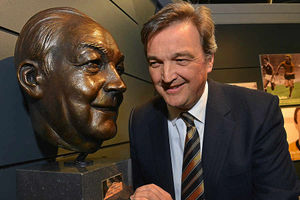It was written in 1859, but could have been resurrected to perfectly sum up the fortunes of Wolves in the 1980s.
The best of times? The start of the decade and lifting the League Cup at Wembley in 1980, still Wolves’ most recent major trophy. And at the end of the decade, the revival, with another Wembley win in the Sherpa Van Trophy in the midst of back-to-back promotions from the lower leagues.
The worst of times? The early and mid-points of the decade. Almost going out of business in 1982 and 1986. Sailing mighty close to the wire. Half the stadium condemned, crowds at rock bottom, successive relegations from first division to fourth. Those weren’t the days my friend.
In terms of the main protagonists around the club in that period, there is one name who, whilst earning just and deserved recognition for his commitment and dedication, probably still goes slightly under the radar as regards the depth and range of his overall contribution.
Today marks a century since the birth, in Shropshire, of Jack Harris. A humble, family man whose impact on Wolves’ fortunes in the Eighties and Nineties played such a key role in preventing one of English football’s most famous institutions from going to the wall.
In the establishing and growing of key relationships with important council leaders, in underwriting the signings of Steve Bull and Andy Thompson, in bringing Billy Wright back into the Wolves fold, and in working so closely with Sir Jack Hayward, Harris not only prevented the good ship Molineux from sinking to the bottom of the ocean. He helped right its passage, setting a course for a comeback and journey which set sail for the current day, with Wolves now into an eighth successive season in the Premier League.
It is little wonder that he had a stand named after him. The South Bank. Previously a terrace which had become home to the noise and the passion of the most vociferous fans after the North Bank was forced into closure. Or that a specially commissioned bust of his head, designed by James Butler, the sculptor responsible for the statues of Wright, Stan Cullis and Hayward, has been residing in Wolves Museum since being produced a decade ago.
“Dad never expected anything like those accolades,” explains Harris’s son John, who feels both fortunate and privileged to have shared so many years on the Wolves’ board with his Dad.
“He was quite a humble person, and all he ever wanted to do was support Wolves, his club.
“He didn’t play for the club, or manage the club, but it was such a great honour that he was recognised in that way.
“I remember the first night when the Stand was unveiled with the special game against Honved – Dad said it was the best day of his life apart from when he got married!”
Born on September 11th in 1925, and brought up in Old Park in Telford, football was heavily involved in the life of Jack Harris from an early age.

John Harris with the bust sculptor in honour of his Dad.
A left-footed midfielder who played at a decent level especially while studying at Loughborough where he was in the first eleven, Harris was a boyhood friend of Roy Pritchard, who was just six months older and also a Shropshire native having been born in Dawley
Pritchard would go on to become an FA Cup winner with Wolves in 1949, and League Championship winner, the club’s first, in 1953/54.
But his trial is an event which was certainly well remembered in the Harris household.
“Dad grew up with ‘Pritch’ from the age of six and they would kick a ball together in their spare time,” recalls John.
“When Pritch got a trial at Wolves, Dad went along purely because of his interest in football, and stood on the side, watching.
“It turned out they were short of a player for the trial game, and so Dad ended up making up the numbers and going in goal.
“That meant he was always able to claim that he’d actually had a trial with Wolves!”
Harris senior was an excellent sportsman in several different disciplines, helped by being ambidextrous in terms of being just as good with right and left hands as he was with right and left feet!
Boxing was another keen favourite, and when he was asked by the careers master at his local grammar school as to his future aspirations, the response was to be either a professional snooker player or footballer!
His own father soon put him straight on that, and so he set off on a very different career path in engineering, alongside playing football locally with Hinkshay, right up until the age of 36.
But alongside building up that career, eventually setting up a family business which would later involve John, that interest in football, and trying to become involved in football, never wavered.
With a friend from student days developing business interests in South Wales, Harris first became involved as a director with Newport County in the 1960s, and then closer to home at Walsall during the following decade, where he eventually became chairman.
Close alliances had been forged with Ken Wheldon and Dick Homden at Walsall, and when Wheldon took over as chairman at Birmingham City, Harris remained with the Saddlers until selling the club in 1986.